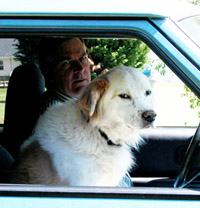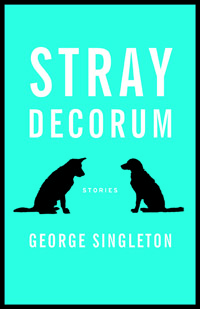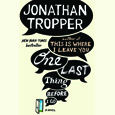Rounding Up the Strays
Chapter 16 talks with George Singleton about the lost dogs—and humans—in his hilarious new story collection
With Stray Decorum, his fourth short-story collection, George Singleton has cemented his reputation as one of the country’s finest—and funniest—masters of the short story. The new collection—which includes work originally published in The Atlantic, Oxford American, Georgia Review, Kenyon Review, and other leading periodicals—brims with stray dogs and stray humans, all looking for a place in this world.
Singleton recently answered questions from Chapter 16 via email.
Chapter 16: What is it like to be master of a form that fewer and fewer people seem to read? Why do you think the short story has fallen out of favor among some American readers?
Singelton: That’s funny. I’m also the master of carbon paper and slide rules. I don’t think I’m any kind of short-story aficionado, but I do believe I write the things better than I do novels. Or poems. Ha ha ha—like I’d ever write poems. Maybe reviewers feel sorry for me and throw that bone my way.
 Anyway, to the more important question, yes, why are American readers so gung ho about novels as opposed to stories? I don’t get it. I do believe, from experience, that publishers really want their stable of writers to focus on longer pieces. Is it because the chances of getting a novel optioned in Hollywood—thus bringing in more dough—are far greater than a collection of stories? Probably. Universities are cutting the budgets of lit journals, so there’s a venue readers will miss. Slick magazines—Atlantic Monthly, for example—seem to be more interested in non-fiction. More advertising space is needed. The list goes on and on. You would think, with this attention deficit disorder stuff going around, that people would want short stories. You’d think they’d be clamoring for haiku.
Anyway, to the more important question, yes, why are American readers so gung ho about novels as opposed to stories? I don’t get it. I do believe, from experience, that publishers really want their stable of writers to focus on longer pieces. Is it because the chances of getting a novel optioned in Hollywood—thus bringing in more dough—are far greater than a collection of stories? Probably. Universities are cutting the budgets of lit journals, so there’s a venue readers will miss. Slick magazines—Atlantic Monthly, for example—seem to be more interested in non-fiction. More advertising space is needed. The list goes on and on. You would think, with this attention deficit disorder stuff going around, that people would want short stories. You’d think they’d be clamoring for haiku.
Chapter 16: These stories share not only common themes but also geographical locations (such as the Unknown Branch of the Saluda River), and some characters seem to reference one another. Did you set out to create an integrated world like Faulkner’s Yoknapatawpha? What are readers to make of these connections?
Singleton: I started off writing thirty-five stories about a guy named Stet Looper who worked on getting a low-residency master’s degree in Southern culture studies at a place called Ole Miss-Taylor. In some of those stories he was the narrator, and in other stories he showed up as a secondary character, or flat-out barely in a cameo role. That collection came to about 400 pages. My ex-agent said she didn’t even want to try selling a collection of mine until I wrote a novel that she “liked.” The next agent didn’t mind my writing short stories forever but said that no one would want to publish a 400-page collection. So the thing kind of got cut in half, with these stories—thematically spun around “strays” (and by that I mean dogs, one monkey, and every human character involved)—grouped together. The next book—it’s called Between Wrecks—will have some of the other stories, plus an odd novella that kind of wraps up (I hope) what this Stet Looper guy wrote for his low-res thesis. As to what readers might want to make of these connections, I don’t know. Small world. Life ain’t fair always. Us against them.
Chapter 16: As the title and cover art suggest, a number of dogs (and a few other animals) populate this book. They exhibit a sort of country nobility that outshines some of the humans around them. What is your own relationship with dogs? Have animals influenced your way of looking at the world?
“Why are American readers so gung ho about novels as opposed to stories? I don’t get it. You would think, with this attention deficit disorder stuff going around, that people would want short stories. You’d think they’d be clamoring for haiku.”
Singleton: At this moment we have seven stray dogs and one stray cat. We’ve been up to eleven dogs, and as few as four. Every one of them was thrown out near where I live. There’s a tree farm across the street, and not much elsewhere. Believe me when I say that we’re not hoarders of animals—we’ve found homes for a good few dozen and had to call Animal Control concerning the sicker, or more feral, dogs. I’ve had one stray live to be nineteen, and one right now that’s eighteen. My dog Dooley—I’ve written about him in an essay or two—is going on thirteen. They eat normal cheap dry food. They have their alpha dog spaces in the yard and house. They show nothing but unconditional love, you know—maybe that’s what my characters strive for. I bet a certified psychiatrist could tell me the truth about this. Or maybe Dear Abby.
Chapter 16: Many of your characters, even in the most rural settings, possess advanced degrees. Yet higher education doesn’t seem to have done them much good, in terms of monetary success or personal fulfillment. In fact, it seems to lead them down some hilariously bad paths. Does this say anything about your own attitudes toward higher education? How is it that educated people make such poor choices?
Singleton: Another great question. Listen, I’ve been reading all these studies about how maybe college degrees aren’t really worth the student debt that will ensue. If it’s all about money, that’s probably right. My father—who ran away from home in the tenth grade and never returned—actually pointed out to me that education wasn’t a means to an end, but an end in and of itself. It’s good to fill up one’s brain, or to be able to use it creatively. Unfortunately, well-educated people, especially ones with degrees in the humanities, might at times sit around thinking, “I have helped a whole generation learn to love reading,” or whatever, “while some kind of numb-nuts politician/athlete/lottery winner is doing nothing to help further humanity.” These people—if they’re really paying attention—will probably reconsider Camus’s The Myth of Sisyphus. My characters probably reconsider the notion that if one doesn’t like the existing conditions, then he or she needs to rebel.
 Oh—as to why educated people make such poor choices. My characters probably make poor choices because they’re on the brink of giving up, or they’re so blinded by optimism that they think change will occur soon.
Oh—as to why educated people make such poor choices. My characters probably make poor choices because they’re on the brink of giving up, or they’re so blinded by optimism that they think change will occur soon.
Chapter 16: As a writer who has continued to produce both novels and short stories, could you speak to the different ways you approach each form? How do you decide which ideas should become stories, and which should be novels? How do you balance your time between the two?
Singleton: The two novels I’ve written spawned from short-story ideas that got out of control. Simple as that. Every time I’ve sat down thinking—OK, Novel time!—it has bogged down mercilessly somewhere around page eighty, and then I’ve pounded the keyboard hoping something would magically create a veil that would keep the reader from understanding that no plot existed. Hasn’t worked yet.
Chapter 16: There is a two-word phrase repeated by many characters in this book, often after a funny or outrageous observation, and it is repeated to a degree that it seems to grow from ordinary Southern vernacular to a mantra of the South, perhaps of life itself: like that. Did you intend some deeper meaning, some higher truth, like that?
Singleton: God, it must be like my own personal stutter. Weird. I don’t even notice it. One time I told a reviewer, “I don’t even notice it!” like that.
Chapter 16: As of this writing, the Amazon Kindle edition of Stray Decorum is ranked as a nonfiction travel book. While I’m not sure the book is exactly a reference guide for the visitor to South Carolina, or to the South Atlantic Region in general, it does point out the degree to which your work has been labeled “Southern,” even as you continue to publish in some of the best Northern magazines and journals. How do you feel about being a recognizable Southern writer?
I don’t care what people label my work. Or me. As long as they’re talking, I’m alive to a certain degree, I figure.
Singleton: First off, screw Amazon. Not that I’m paranoid, but there’s someone who probably’s doing that on purpose about the travel-writing stuff. I see nothing but bad things coming out of a corporation wishing to monopolize what the public can read. Does Amazon bring in writers to do readings and signings? When I buy a book from Amazon in South Carolina, does someone in my community make any money, then use that money to, say, buy her child organic sweet potatoes? I could go on and on, and I would be fighting a losing battle I think.
As to “Southern writer,” I figure it must be some kind of badge of honor. I don’t think people are using it as in “Oh, he’s only a Southern writer, not a real writer.” When I’m away from my turf, people ask this with a smile on their lips. Unfortunately I think they have “Are you like those Southern writers who drink bourbon non-stop and know people in real life who work with their hands” on their minds.
I don’t care what people label my work. Or me. As long as they’re talking, I’m alive to a certain degree, I figure.
Chapter 16: What’s next?
Singleton: After that Between Wrecks collection, I suppose I’ll be gathering another slew of stories together, all of which take place in an area called Calloustown. Same old same old, really. New characters, same fights and dreams. “You can’t ever have enough fights and dreams, I’m thinking,” I said, like that.
[This interview appeared originally on September 19, 2012.]
George Singleton will give a free public reading at Montgomery Bell Academy in Nashville on April 21, 2014. The event will take place in the Dead Poets Society Room of Lowry Hall at 5 p.m.





